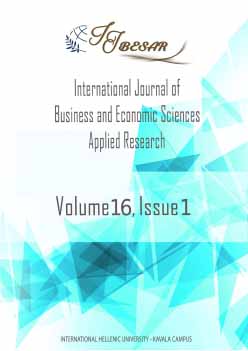Exploring the Impact of Financial and non-Financial Motives on Employee Performance. A Survey of Indonesian Employees.
Exploring the Impact of Financial and non-Financial Motives on Employee Performance. A Survey of Indonesian Employees.
Author(s): Maria Argyropoulou, Aprilia Wynne, Rachel Argyropoulou, Dionisia TZAVARASubject(s): Economy, Labor relations
Published by: Τεχνολογικό Εκπαιδευτικό Ίδρυμα Ανατολικής Μακεδονίας και Θράκης
Keywords: Employee motivation; employee performance; financial incentives; Indonesia;
Summary/Abstract: Purpose: Employees in any workplace around the world should feel motivated to achieve optimal results. Older and more recent research in this area demonstrates the importance of motivation to employee productivity and organizational performance. This research aims to determine not only the role of work motivation on employee performance but also the magnitude of its impact, both theoretically and practically. Design/methodology/approach: Quantitative data were gathered by using a questionnaire with 27 close-ended questions. Data was collected from 150 employees in Indonesia with at least one year of work experience. The analysis of this study is carried out with the program SPSS 26. Findings: The results of this study show a positive relationship between employee motivation and employee performance, which supports previous research findings and underscores the importance of motivation as an effective tool for today's managers who must respond to unprecedented challenges in a rapidly changing environment. The most important finding from this research is that financial awards is not a statistically significant predictor of employee performance which supports the theory that intrinsic rewards play the most important role in motivational strategy. Research limitations/implications: Data from respondents in Indonesia were used for this study. Further research in other international locations is needed to generalise the findings globally. The results of this research suggest that companies, especially those with a majority of employees between the ages of 18 and 29, should strengthen mutual relationships within the company, involve employees in the decision-making process, and provide more opportunities for career advancement, promotions, and employee participation to improve the performance of their employees. Originality/value: This study contributes to theory by going a step further and examining the impact of three specific factors on employee performance: financial factors, career aspirations, and mutual relationships.
Journal: International Journal of Business and Economic Sciences Applied Research (IJBESAR)
- Issue Year: 16/2023
- Issue No: 1
- Page Range: 40-53
- Page Count: 14
- Language: English

